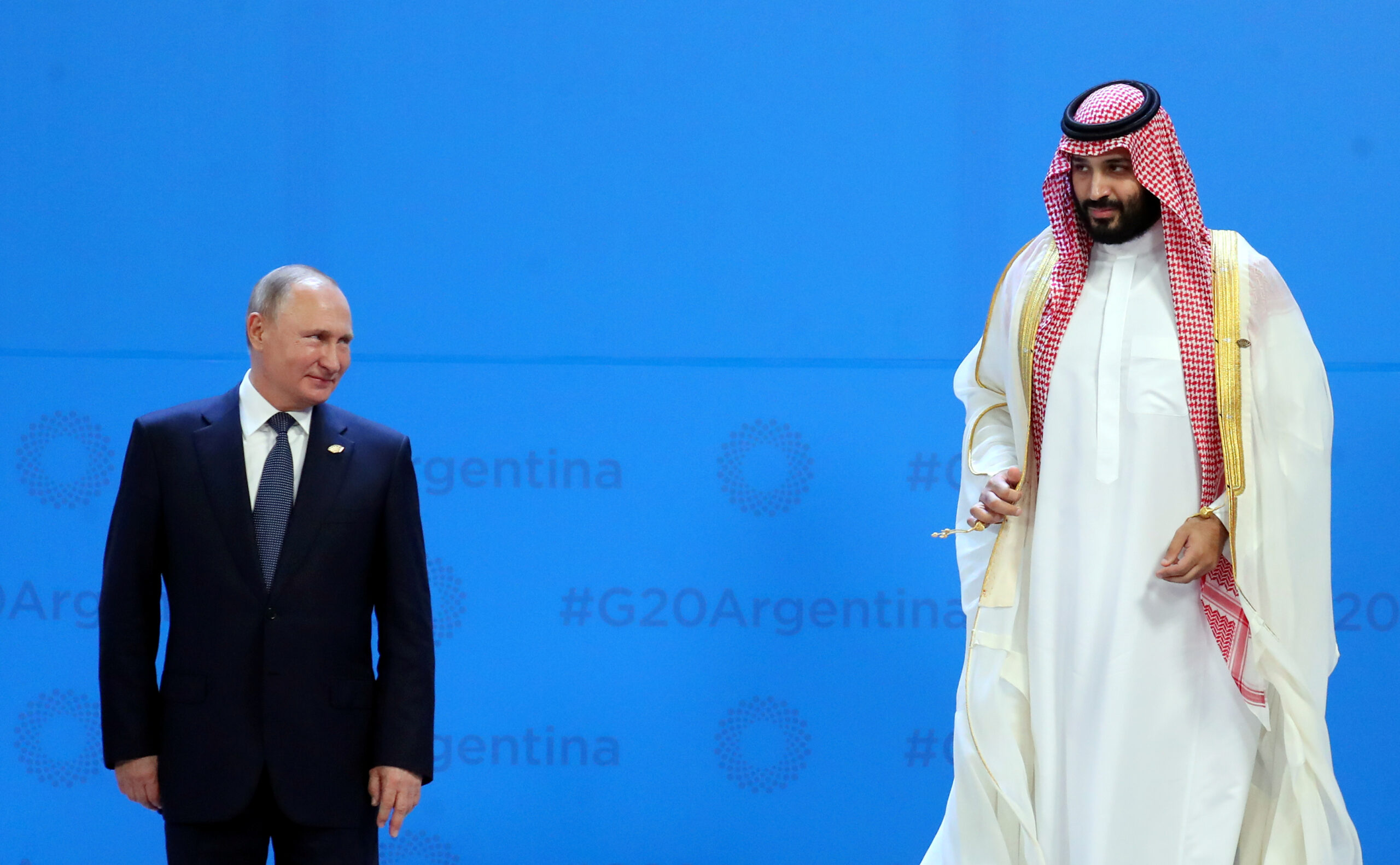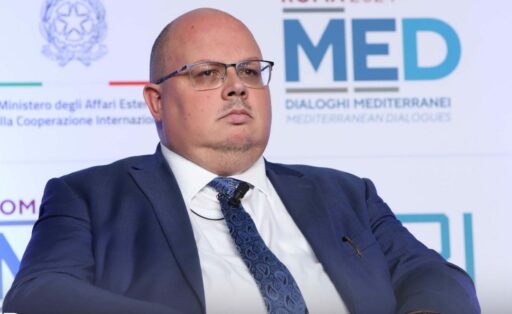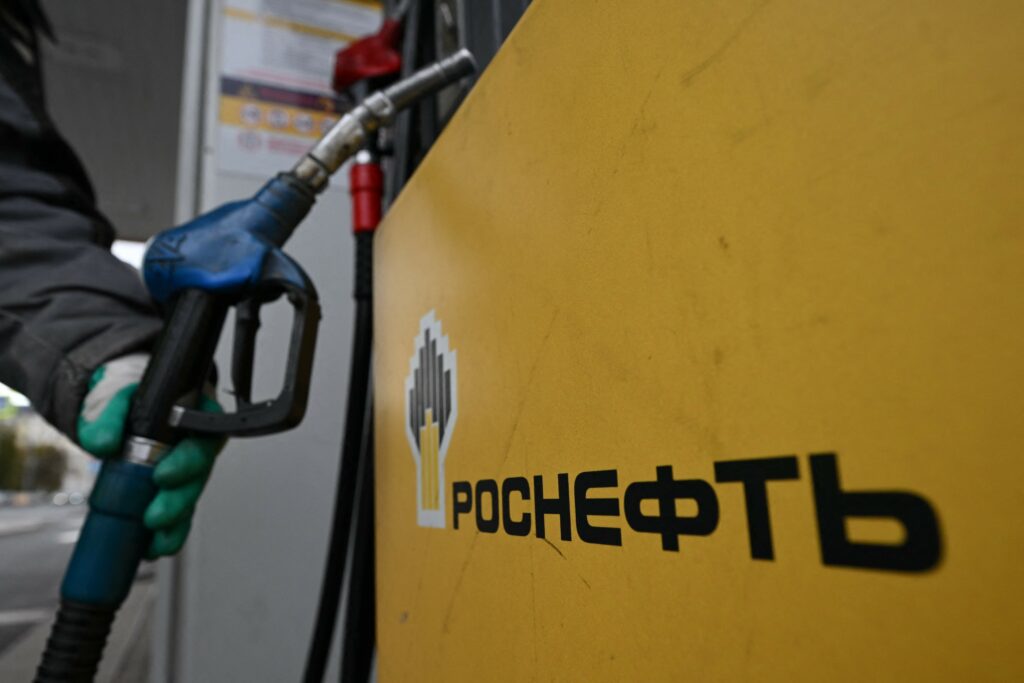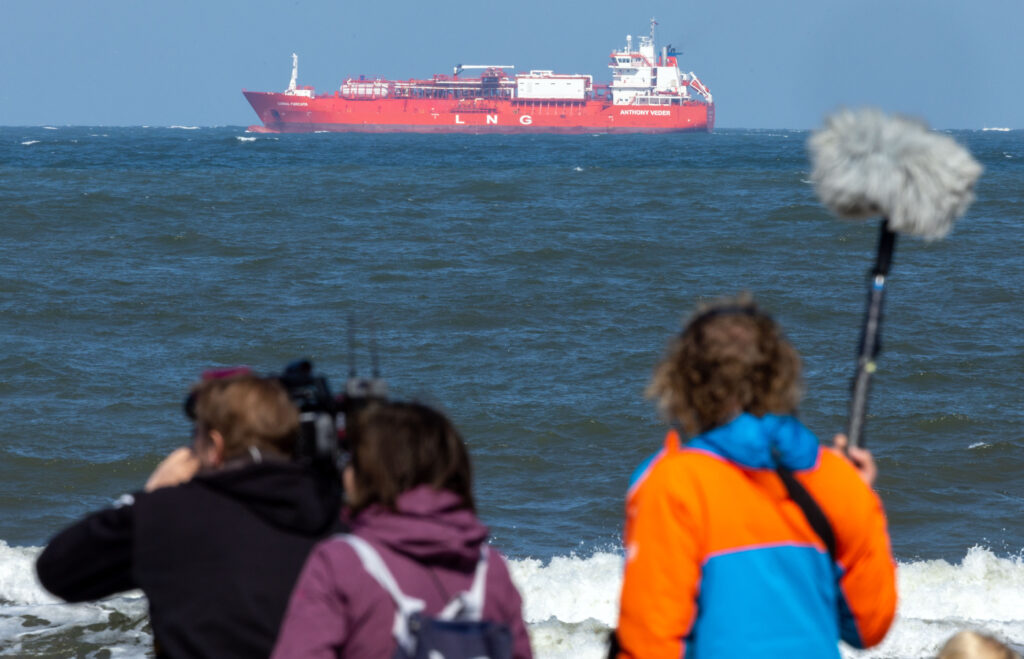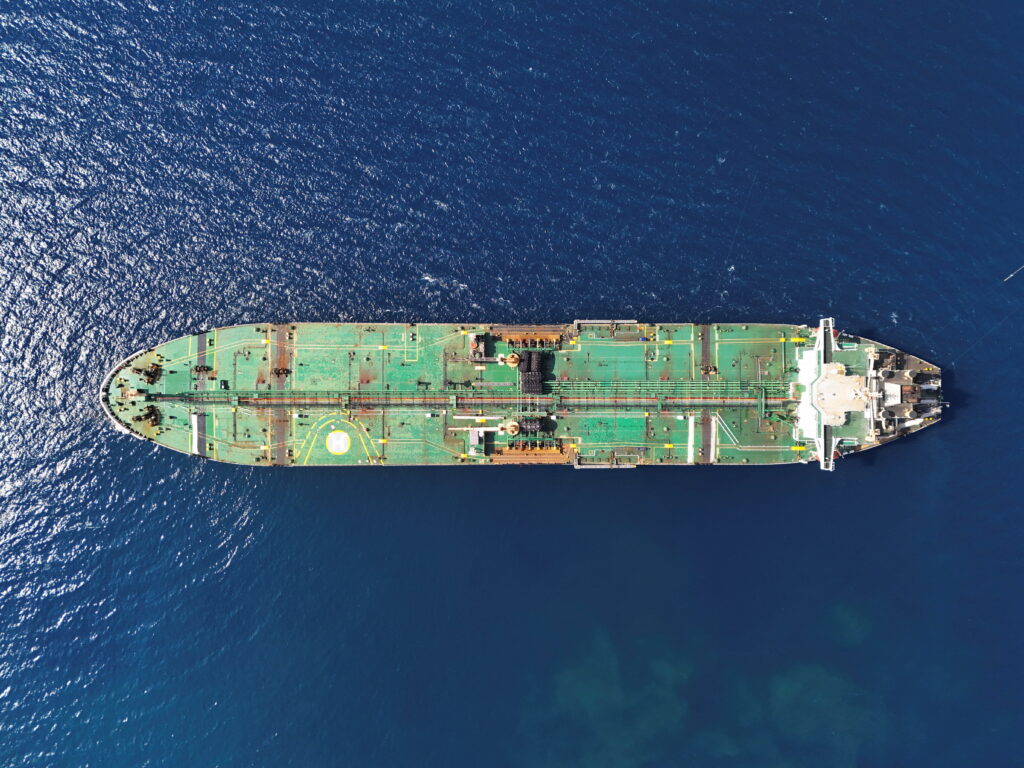In contemporary expert circles, it is widely believed that the countries of the Gulf Cooperation Council (GCC), i.e. Saudi Arabia, Kuwait, Bahrain, Qatar, UAE and Oman, generally align with Putin’s Russia in its confrontation with the West, as well as on the war in Ukraine. The main motivator, allegedly, is the economic benefit these countries derive from the reorientation of the Russian economy towards Asia, as well as from assisting Moscow in circumventing sanctions. Separately highlighted is the co-operation with Russia within the OPEC+ framework, aimed at maintaining a price level that would be acceptable to Arab oil producers. While these assertions hold some truth, important nuances prevent this co-operation from being considered an alliance or even a stable partnership.
Counting the benefits
Russian trade and economic co-operation with the Gulf countries—primarily Saudi Arabia and the UAE—has indeed increased significantly since the outbreak of the full-scale war. According to the Russian media, in the period of 2021−2023, Russian-Saudi trade increased from USD 2.2 billion to USD 3.3 billion, and Russian-UAE trade turnover rose from USD 5.3 billion to USD 11.2 billion. However, this is not just about trade turnover as such or the participation of the aforementioned countries in schemes to circumvent the sanctions imposed on Russia. Against the background of the difficult economic situation in Russia itself, the development of an investment partnership between Moscow and the GCC countries has become an important indicator. With the reorientation of Moscow’s economic relations towards non-Western partners, the role of the Arab monarchies of the Persian Gulf has increased as markets for the products of the Russian agrarian and industrial complex, producers of precious stones and precious metals, and IT technologies. Russian fuel oil and diesel fuel have also found their consumers in the Persian Gulf. Moreover, it is not only about resale and playing on the price difference, when Russian raw materials are bought at a discount and their own exports are more expensive, but also about meeting the domestic needs of Saudi Arabia for additional fuel for power plants during peak periods. In other words, Russia has become more involved in ensuring the food and energy security for a number of countries in the region since the start of the full-scale invasion of Ukraine.
For the Russian economy to survive in the new conditions, international transport corridors have gained particular importance, providing Moscow with access to Asian and African destinations. And here the GCC countries cannot be left out. Their participation in the work of the North-South International Transport Corridor passing through Iran can give an additional impetus to the development of this transport corridor, and the storage facilities of the port of Fujairah (UAE) have become an important springboard for the supply of Russian hydrocarbons to Africa, Asia and even Europe (although via ‘grey’ methods).
Russia is also developing relations with the GCC countries by working in multilateral formats. The 2024 Kazan summit cemented the UAE’s accession to BRICS, and the interaction between Saudi Arabia and Russia within the OPEC+ framework is strategic. Russia is also trying to develop contacts with the UAE and Saudi Arabia within the framework of the Eurasian Economic Union (EAEU). In 2024, the UAE advanced plans to create a free trade zone with that integration bloc.
Political dialogue and its implications
The development of economic contacts goes hand in hand with intensified political engagement at various levels. The year 2023 was particularly important and productive from this perspective, culminating in Putin’s grand visits to the UAE and Saudi Arabia. From a practical point of view, however, the sixth ministerial meeting of the Russia-GCC strategic dialogue, which took place in Moscow, was much more significant. The meeting adopted a plan of joint actions for 2023−2028 and clearly outlined priority areas for the development of cooperation between Moscow and the Arab monarchies of the Persian Gulf: trade and economic cooperation, investment cooperation, trade and regional issues (primarily the situation around the Palestinian question). In autumn 2024, these agreements were reaffirmed at the seventh ministerial dialogue meeting in Riyadh.
The GCC states are very reluctant and pressurised to comply with Western sanctions against Russia, and sometimes refuse to comply with them altogether. When discussing the war in Ukraine, they try to remain neutral. Of the six countries in the region, only Qatar and Kuwait have made any critical statements against Moscow. In Saudi Arabia and the UAE, anti-Putin statements are not welcome at all. Moreover, in the sanctions war between Russia and the West, the ruling elites of the Arab monarchies of the Persian Gulf periodically take Moscow’s side, accusing Western countries of destabilising energy markets and harming the global economy by applying sanctions against Russia.
Not yet an alliance
It is still too early to speak of the emergence of an alliance between Russia and the GCC countries. Firstly, they should not be seen as a monolithic bloc. Each country has its own approach to Russia, its confrontation with the West and the Kremlin’s actions in Ukraine. While the elites of Saudi Arabia and the UAE try to avoid criticising Russia, Kuwait and Qatar, drawing on their own historical experiences on Ukraine, were critical of Moscow’s actions even at in the early months. Also, active contacts with Russia do not signal a lack of interaction with Ukraine, which is eagerly welcomed in the Gulf (in Qatar and Saudi Arabia) and provided with both humanitarian and diplomatic assistance.
The American factor remains significant, and even the region’s leader, Saudi Arabia, is taking this into account: in particular, while still contemplating Trump’s potential return to the White House, Riyadh has sought to delay its rapprochement with BRICS to avoid straining relations with the new US administration. There is also some lack of clarity as to why, contrary to initial news reports, Riyadh, rather than Doha (traditionally closer to the United States), was selected as the host of the 7th Russia-GCC Ministerial Meeting for Strategic Dialogue.
Representatives of the diplomatic circles of the GCC countries emphasise that allied relations with the US have been and remain a priority for them, and that the development of contacts with Russia takes place as long as it does not harm ties with Washington (however, the tolerance for potential harm can vary: from the lowest in Kuwait and Qatar to the highest in the UAE). Interestingly, even the UAE is forced to observe sanctions when the US seriously insists on it. This raises the question of the effectiveness of the GCC countries in helping Moscow to circumvent sanctions. As practice shows, this effectiveness is rather exaggerated.
We see it all
The techniques employed by Russia to trade oil and petroleum products—using shadow fleet, trading oil on tankers with disabled trackers, re-exporting through third countries, falsifying product origin documents and so on—are largely copied from well-known Iranian practices. Additionally, the primary routes for circumventing sanctions and the key players involved are no secret. While identifying the details, such as companies and individuals, may take some time, it is entirely feasible. As the experience of Trump’s first presidential term with sanctions on Iran has shown, if there is sufficient political will, Arab sanctions transit can be significantly reduced, if not completely blocked. In other words, the West allows Arab monarchies to help Moscow circumvent sanctions and profit from it. The logic is quite simple: Russia is too crucial for the global economy as a supplier of energy resources. It is not Iran or Venezuela. Replacing Russia with a full trade embargo would be challenging, if not impossible. Furthermore, the ripple effect of this step on the global economy—which will face a new round of rising energy prices with a subsequent negative impact on other economic sectors—would be difficult to contain.
Already in the first year of the sanctions war between the West and Russia, EU countries developed an unofficial principle: GCC countries can engage with Russia with impunity on the whole range of issues (including sanctions circumvention) as long as their cooperation does not directly affect the situation on the frontline, contributes to avoiding further destabilisation of the economic situation and does not blatantly undermine the sanctions regime. This principle largely explains why the GCC countries can serve as transshipment hubs for trade in Russian oil and petroleum products, while being more stringent, for example, about adhering to financial restrictions on co-operation with Russia. The GCC countries try not to cross the actual ‘red lines’, choosing to breach them only where it is permissible.
Nothing personal
In the current circumstances, it is mistaken to assume that the Arab monarchies of the Persian Gulf are forming an ‘alliance’ with Russia or adopting an overtly pro-Russian stance. Their policies are determined by pragmatism, shaped by their unique perception of the war in Ukraine and the global political situation. The real motives behind the GCC countries’ actions are often only loosely linked to Russia.
Firstly, most Arab monarchies do not see the war in Ukraine as ‘their’ conflict. It appears remote, unrelated to their region, history or culture. Moreover, the Western countries’ focus on the situation in Ukraine, often at the expense of Middle Eastern issues, reinforces the detachment of Arab leaders.
Secondly, pragmatism permeates the policies of countries such as Saudi Arabia, the UAE and Kuwait, which support co-operation with Russia within OPEC+. These countries are interested in maximising revenues from hydrocarbon exports and maintaining their influence over volatile oil markets. Russia plays an important role in ensuring the effectiveness of OPEC+, and severing ties with Moscow would likely cause more harm than good.
Thirdly, it is worth noting that GCC countries continue to actively re-prioritise their foreign policies, primarily related to the evolving role of the US in the region. The limited US response to the 2019 attacks on Saudi oil facilities in Abqaiq and Khurais, allegedly perpetrated by Iran-backed Houthis, demonstrated to GCC member states that the US is no longer interested in ensuring their security to the same extent as before. Meanwhile, US politicians subsequently threatened to pass the so-called NOPEC bill (No Oil Producing and Exporting Cartels Act) against OPEC as punishment for higher oil prices, along with a number of other steps, including the US release of oil from the Strategic Petroleum Reserve to lower prices in 2022, which showed that even a once loyal ally can play against the interests of the Arab monarchies of the Persian Gulf if it deems it necessary. In such a situation, the GCC countries are making considerable efforts to diversify their foreign policy relations in order to ensure a safer and more independent pathway while retaining relations with the US as a major partner. Thus, it is not in the interests of the GCC countries to fully align themselves with either the anti-Russian or the pro-Russian camp.
Fourthly, the Gulf countries exhibit certain empathy towards Russia, fearing that the sanctions mechanisms used against Moscow may one day be used against them. For example, the EU’s initiative to impose a price cap on Russian oil was seen by Saudi Arabia as a potential threat to its own interests, bringing Riyadh closer to Moscow.
Finally, the global green agenda is reshaping the policies of the Arab monarchies. In order to remain competitive on world markets, they are forced to adapt to new environmental responsibility standards, which brings them closer to Russia, faced with similar challenges. At the same time, this creates tensions with the West, which advocates for an accelerated energy transition.
Thus, the policies of the Arab monarchies towards Russia are not driven by alliance-building aspirations, but by pragmatism, a balancing of interests, and a desire to minimise risks in an unstable global environment.
What’s next?
The relations between Russia and the Arab monarchies of the Persian Gulf are far from an alliance. Moreover, one cannot even speak of it as a long-term partnership. Russia and the GCC countries—primarily Saudi Arabia and the UAE—have turned out to be more like fellow travellers, whose interactions are dictated by mutual economic benefits and strategic calculations. These ties have evolved in the face of significant constraints from sanctions and the influence of US foreign policy. Despite active engagement, the GCC countries continue to balance between Moscow and the West, guided by the logic of pragmatism and their national interests. The future of this partnership will largely depend on shifts in global energy policies, the role of the US in the region, and the ability of the parties to adapt to new challenges.
